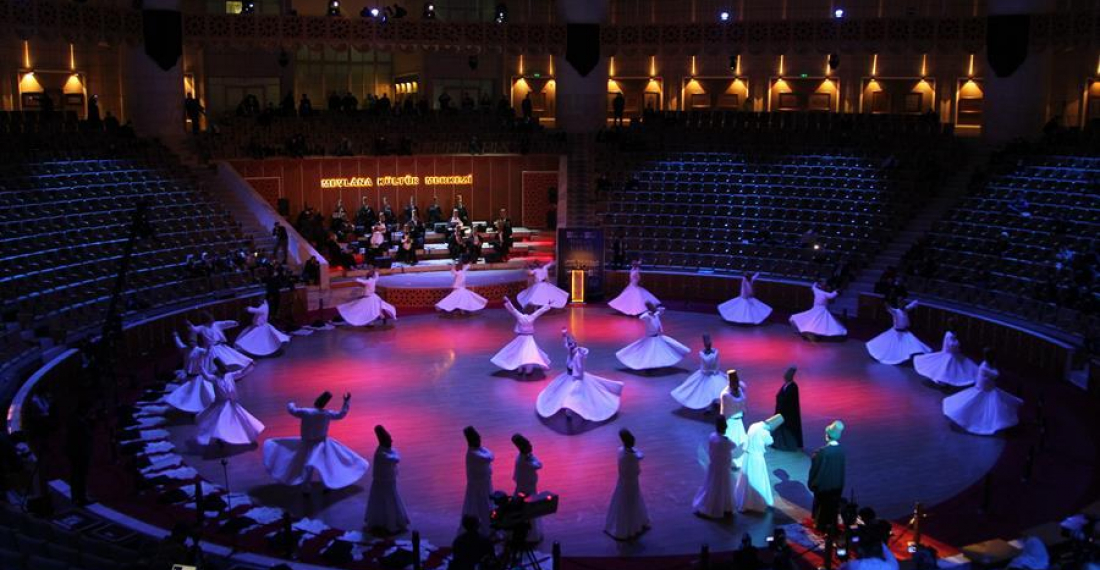The 747th anniversary of the death of the most important Sufi mystic and poet in the world, Jalal al-Din Rumi was commemorated during the “Seb-i Arus” ceremony held on December 17 at the Mevlana Cultural Centre in Konya, in Turkey. This annual commemoration was this year held in virtual format because of the coronavirus pandemic.
The Speaker of the Turkish Parliament, Mustafa Sentop, and Turkey’s Culture and Tourism Minister Mehmet Nuri Ersoy attended the ceremony marking the anniversary of Rumi’s death. The ceremony, which was held without an audience and for one hour due to the pandemic, started with the Gulbank prayer in front of his tomb at the Mevlana Museum.
“A Sufi who's memory is honoured not only by Muslims but also by Christians and other faith members,” Sentop said in a speech he made following the event.
The event is one of the highlights in Turkey's cultural calandar, and every year sees visitors from all over the world gather in the Central Anatolia city to pay homage to what Rumi was – a man of great tolerance, capable of showing always the feeling of love towards the entire world welcoming people, regardless of religion and their race. Rumi had many qualities: he was a poet but also a jurist, Islamic scholar, theologian, and Sufi mystic, but not only that. In fact, he represented a virtuous life in which he believed in his “true essence,” arguing that the rest “was nothing but appearance.”
The celebrations fall as usual on the day of his death, December 17, when the second ceremony “Seb-I-Arus” is held, which UNESCO has included in the List of Intangible Heritage of Humanity – the first was held on December 7. Mysticism and charm come together on this date. Rumi’s disciples, known as the “whirling dervishes” dressed in white and with a cone-shaped headdress, perform the traditional and whirling sema. They turn on themselves repeating the name of God, accompanied by musicians who reproduce the sound of the celestial spheres and who in the final movement give way to silence.
This is a moment of high mysticism that has found space in Konya since 1937. The city dates back to 7000 BC and is one of the best known in Turkey – appreciated for its rich historical and artistic heritage. Konya can be considered “the cradle of civilizations and religions” as well as the city of Rumi, whose teachings greatly influenced mystical thought and literature throughout the world.
It is said that Rumi became immensely sad after the departure of his teacher Shams-i Tabrizi (Shams of Tabriz) with whom he had discovered the depths of spirituality. This loss caused a great change in his soul. He gave up everything and wrote the “Masnavi,” widely recognized as the greatest Sufi poem ever written and composed of 25,000 lines.
For Rumi true love meant love for Allah (God) while death was the day he would join the divine. This is why December 17, the anniversary of his death, is known not as a day of mourning but as a day of celebration to be experienced with the Seb-i Arus ceremony which in Turkish means “the night of reunion” or “the night nuptial.”
Rumi interprets death as a return to one’s origin, a “return to Allah” due to the fact that its origin is divine. According to him, death is not physical death, but the journey to Allah.
Rumi's poetry collections are considered to be among the most popular in the USA. He was the best-selling poet in America, and his poems have been used in wedding celebrations for decades as well as in the rest of the world. And he has been compared to Shakespeare for his creative vein and to St. Francis of Assisi for his spiritual wisdom.
A selection of love poems by Rumi published by the Deepak Chopra (Publishing House) with a translation by Fereydoun Kia, have been interpreted by Hollywood personalities such as Madonna, Goldie Hawn, Philip Glass, and Demi Moore. There is a famous gateway to the city of Lucknow (the capital of Uttar Pradesh) in northern India, called Rumi Gate, in his honor.






